

Stand Up To Tackle Abstract Problems, Sit to Work on Practical Matters. Why Walking Helps Us Think - The New Yorker. In Vogue’s 1969 Christmas issue, Vladimir Nabokov offered some advice for teaching James Joyce’s “Ulysses”: “Instead of perpetuating the pretentious nonsense of Homeric, chromatic, and visceral chapter headings, instructors should prepare maps of Dublin with Bloom’s and Stephen’s intertwining itineraries clearly traced.”

He drew a charming one himself. Several decades later, a Boston College English professor named Joseph Nugent and his colleagues put together an annotated Google map that shadows Stephen Dedalus and Leopold Bloom step by step. The Virginia Woolf Society of Great Britain, as well as students at the Georgia Institute of Technology, have similarly reconstructed the paths of the London amblers in “Mrs. Dalloway.” Such maps clarify how much these novels depend on a curious link between mind and feet. Since at least the time of peripatetic Greek philosophers, many other writers have discovered a deep, intuitive connection between walking, thinking, and writing.
The Science Behind Posture and How It Affects Your Brain. French Polymath Paul Valéry on “The Three-Body Problem” Amy Cuddy: Your body language shapes who you are. Writing Can Help Injuries Heal Faster. Expressive writing is known to help assuage psychological trauma and improve mood.
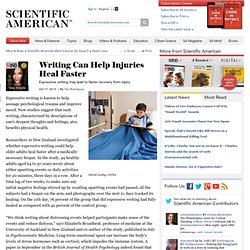
Now studies suggest that such writing, characterized by descriptions of one's deepest thoughts and feelings, also benefits physical health. Researchers in New Zealand investigated whether expressive writing could help older adults heal faster after a medically necessary biopsy. In the study, 49 healthy adults aged 64 to 97 years wrote about either upsetting events or daily activities for 20 minutes, three days in a row. After a time lag of two weeks, to make sure any initial negative feelings stirred up by recalling upsetting events had passed, all the subjects had a biopsy on the arm, and photographs over the next 21 days tracked its healing. What Does "Listen To Your Body" Actually Mean? We hear this all the time: Listen to your body!

We should follow how we feel, right? An Atlas Of The Human Body That Maps Where We Feel Emotions. Many people feel emotions in certain parts of their bodies--stress in their neck or anxiety in their stomach, maybe happiness in their chest.
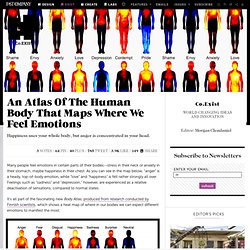
As you can see in the map below, “anger” is a heady, top-of-body emotion, while “love” and “happiness” is felt rather strongly all over. Feelings such as “sadness” and “depression,” however, are experienced as a relative deactivation of sensations, compared to normal states. It's all part of the fascinating new Body Atlas, produced from research conducted by Finnish scientists, which shows a heat map of where in our bodies we can expect different emotions to manifest the most.
To create the map, the researchers showed more than 700 volunteers various words, stories, movies, and images associated with different “basic” and “complex” emotions, and asked them to point out bodily regions where they felt increasing and decreasing activity in reaction. Ariel Garten: Know thyself, with a brain scanner. Top 10 Reasons to Exercise Regularly (Besides Losing Weight) Scientific Proof That Negative Beliefs Harm Your Health. The medical establishment has been proving that the mind can heal the body for over 50 years.

We call it “the placebo effect,” and we know that when patients in clinical trials get nothing but sugar pills, saline injections, or fake surgeries—but believe they might be getting the new wonder drug or miracle surgery—their bodies get better 18 to 80% of the time. Scientists Finally Show How Your Thoughts Can Cause Specific Molecular Changes To Your GenesTunedBody. With evidence growing that training the mind or inducing certain modes of consciousness can have positive health effects, researchers have sought to understand how these practices physically affect the body.
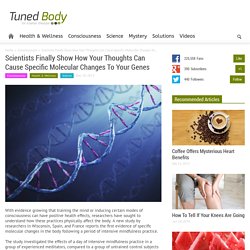
A new study by researchers in Wisconsin, Spain, and France reports the first evidence of specific molecular changes in the body following a period of intensive mindfulness practice. Rethinking the Placebo Effect: How Our Minds Actually Affect Our Bodies. By Maria Popova The startling physiological effects of loneliness, optimism, and meditation.
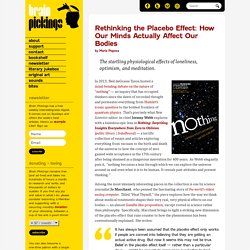
In 2013, Neil deGrasse Tyson hosted a mind-bending debate on the nature of “nothing” — an inquiry that has occupied thinkers since the dawn of recorded thought and permeates everything from Hamlet’s iconic question to the boldest frontiers of quantum physics. That’s precisely what New Scientist editor-in-chief Jeremy Webb explores with a kaleidoscopic lens in Nothing: Surprising Insights Everywhere from Zero to Oblivion (public library | IndieBound) — a terrific collection of essays and articles exploring everything from vacuum to the birth and death of the universe to how the concept of zero gained wide acceptance in the 17th century after being shunned as a dangerous innovation for 400 years. As Webb elegantly puts it, “nothing becomes a lens through which we can explore the universe around us and even what it is to be human. It reveals past attitudes and present thinking.” Donating = Loving. What the Science of “Sleep Paralysis” Reveals About How the Brain Works.
By Maria Popova How a neurological nightmare illuminates the wondrous workings of the brain-body connection.
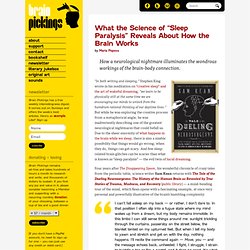
“In both writing and sleeping,” Stephen King wrote in his meditation on “creative sleep” and the art of wakeful dreaming, “we learn to be physically still at the same time we are encouraging our minds to unlock from the humdrum rational thinking of our daytime lives.” But while he was exploring the creative process from a metaphorical angle, he was inadvertently describing one of the greatest neurological nightmares that could befall us. Glogin?mobile=1&URI=